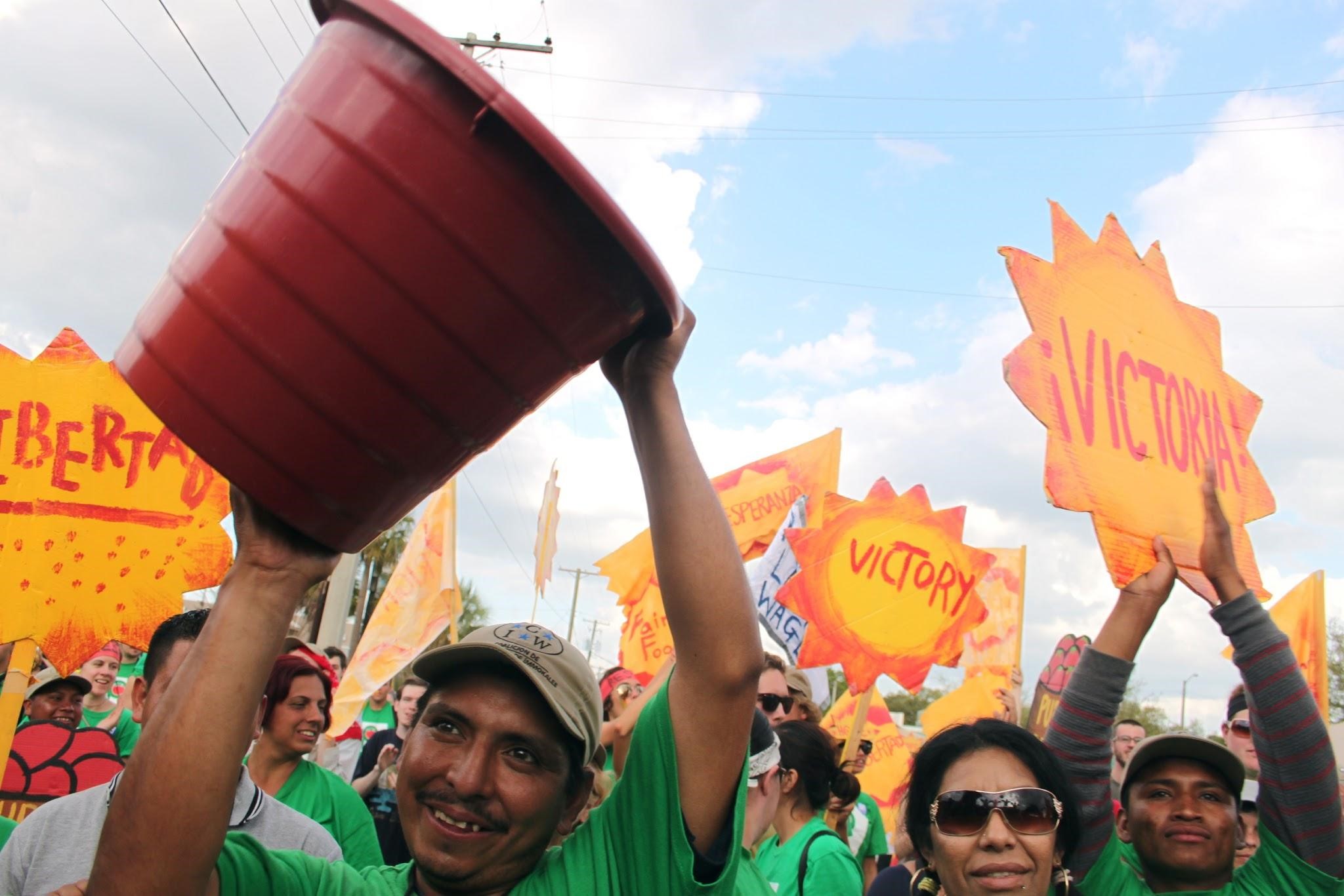By Jennifer Watkins
When shopping at our local grocery store or eating at our favorite fast food establishment, we usually don’t think about the worker who picked the fruit we are buying. If we do, we may assume that the farm workers picking our produce receive decently fair treatment. Many think that the fight for farm worker rights in America ended in the 1960s with Cesar Chavez. In reality, thousands of migrant agricultural workers are still suffering gross injustices in our backyard. In 2014, Florida was the number one producer of fresh market tomatoes in the United States, with the majority of those coming from the farms surrounding the area of Immokalee.

Immokalee
Immokalee, a rural community just 50 miles north of the luxurious retirement destination of Naples, is home to 24,154 Floridians, the majority of those being migrant farm workers. These workers, 75 percent of whom are Latino and 41 percent of whom are foreign-born, live in Immokalee for several months out of the year to harvest Florida’s tomatoes and move north in the off-season to harvest other crops.
As day laborers, tomato pickers in Immokalee congregate in a central parking lot every morning around 5 AM, where they are hired and bused to farms as far as 100 miles away. Once the work day begins, workers race against the clock and their fellow workers to fill 32 pound buckets with tomatoes. They are paid according to how many buckets they pick in a day, earning an average of $0.50 per bucket. This pay rate has remained the same for decades, and as a result most farm workers only earn about $40 per 10-hour workday.
The compensation farm workers receive, which is on average $3 below minimum wage, puts them in a position of vulnerability and dependence on their supervisors. Oftentimes workers are not aware of their right to fair treatment, so they put up with extreme mistreatment so as not to lose their job.
In a particularly extreme case in 2007, 3 migrant workers escaped from captivity in a U-Haul trailer parked in front of a house on a major street in Immokalee. These workers were held against their will, forced to work without pay, and “hunted down, beaten, and brought back to the slave house” if they attempted to leave. Unfortunately, this type of slave-like treatment is not unheard of in the migrant farm worker community. While generally not as extreme as the aforementioned example, wage theft and physical abuse are unescapable realities for many farm workers due to a lack of employment options
Women working in the tomato fields are also targets of abuse from their employers, especially sexual abuse. Oftentimes women are conditionally employed based on their agreement to have an ongoing sexual relationship with their supervisor, and even then they are sometimes deprived of payment for their labor in the fields.

The issues faced by Florida’s migrant workers stretch beyond the harsh conditions of the tomato fields. 43.3 percent of people in Immokalee live below the poverty line, with many struggling to find affordable housing due to the exploitative leasing practices of property owners. Because homes in close proximity to the central parking lot are so desirable for workers without reliable transportation, landlords are able to charge upwards of $500 per week for dilapidated trailer homes. Due to these exorbitant prices, workers are forced to live in overcrowded, often unhealthy environments.
Why is this happening?
The North American Free Trade Agreement, signed in 1994, has had major impacts on both the American and Latin American agricultural industries. In Mexico, NAFTA caused the once booming corn industry to ultimately collapse as the market was flooded with artificially underpriced, government-subsidized corn from the United States. As a result, millions of jobs were lost, and millions of farm workers were forced to seek employment elsewhere. Jobs in the major cities of Mexico were quickly taken when farms started to shut down, so many of these farm workers moved to America as a means of survival.
The biggest reason farm workers have yet to receive humane treatment is not farmers’ refusal to pay their employees a living wage, but the produce-buying corporations’ continual demand for the lowest priced goods and indifference towards the human cost of providing such a low price.
What is being done?
While it may seem that the issues Florida’s farm workers are facing are numerous and almost impossible to overcome, advocates within the agricultural community have begun forging a path to justice through social movements.
The Coalition of Immokalee Workers, a worker-run alliance formed in 1993, has led the charge in fighting for the rights of agricultural workers in and around the Immokalee community. The primary focus of the CIW has become to raise awareness of the injustices faced by Florida’s tomato farm workers by organizing rallies and campaigns to put pressure on the large corporations responsible for these poor working conditions.
In 2011, the Fair Food Program was established by the CIW to demand better wages for farm laborers by requiring its member corporations to only buy produce from farms that abide by the Fair Food Program’s requirements, which include paying an extra cent per pound of tomatoes, a premium that significantly affects the annual income of the laborers. Additionally, the FFP requires employers to educate their employees about their rights as workers regardless of citizenship status and abide by a code of conduct for the treatment of workers in the fields. Before the FFP’s labor standards started being implemented, workers could be fired for taking breaks to use the restroom or shield themselves from the harsh sun. So far, 14 major companies have signed these legally-binding Fair Food agreements, including Taco Bell, Walmart, Subway, McDonald’s, and Burger King. As a result, a total of $15 million has been added to the wages of workers across the board since 2011.
Despite the phenomenal support that the Fair Food Program has received, a few major corporations still refuse to sign Fair Food agreements, notably Publix and Wendy’s. The CIW has continued to lead movements against both of these companies.
Politics & farm workers
While protests and boycotts certainly accomplish a great deal by putting pressure on big corporations, farm workers need a voice in the political realm in order for permanent substantial progress to be made.
During his time representing Vermont in the Senate, Bernie Sanders has been an ardent advocate for the Fair Food Program and the rights of farm workers. In 2008, Senator Sanders was instrumental in organizing a hearing on farm worker exploitation in Florida in which he spoke about his recent visit to Immokalee and the injustices he witnessed there, stating, “In America today we are seeing a race to the bottom, the middle class is collapsing, poverty is increasing. What I saw in Immokalee is the bottom in the race to the bottom.” Years later in his campaign for the presidency, Sanders continues to speak out for the just treatment of migrant workers.
Republican lawmakers have yet to take a stance on the issue of the humanitarian crisis of Florida’s farm workers – perhaps surprising given the widespread protests.
In order for tangible change to occur, farm workers need advocates on both sides of the aisle. While a large number of the laborers are undocumented immigrants, the issues both documented and undocumented farm workers face are not inherently a result of their legal status. For many, working in the agricultural industry comes not out of the necessity for acquiring employment without papers, but rather the availability of jobs in general. Many farm workers were not afforded the same educational opportunities in their home country as Americans, including English education. As a result, their options for employment after immigrating to the United States are severely limited, often leading them to acquire low-paying, high-stress jobs that American workers would not take themselves.
The injustices faced by farm workers are far greater than just an immigration-related political issue, but rather are an egregious human rights violation that deserves to receive more attention
both in Washington and in the minds of consumers.
What’s next?
While conditions are improving for tomato pickers in Florida, similar conditions are prevalent in other agricultural industries throughout the United States and the world. The Fair Food Program has made considerable strides towards justice in Florida’s agricultural market, but there is still much more work to be done. When it comes down to it, corporations’ demand for produce is driven by the purchasing habits of consumers. By supporting only corporations that are part of the Fair Food Program, every single person who shops in the produce section or eats at fast food restaurants could have the power to change the lives of thousands of farm workers.
